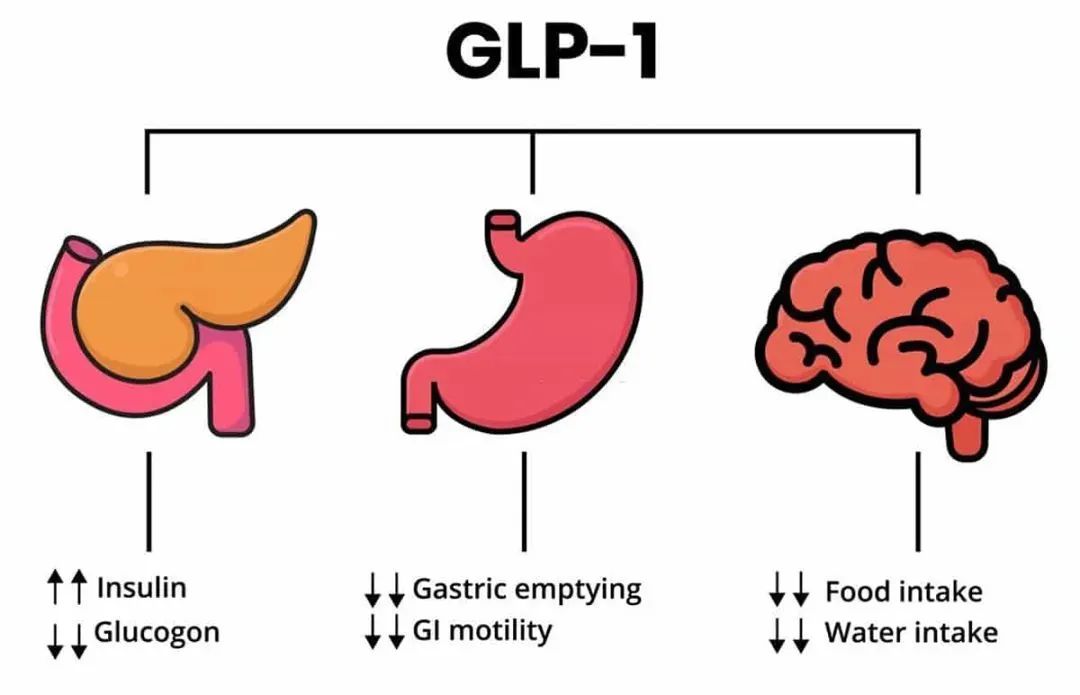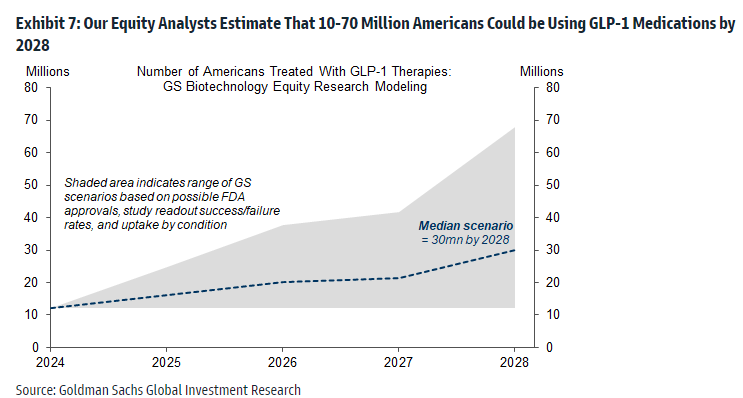Critical hit! GLP-1 drugs are driving changes in global health management
Views : 63
Update time : 2024-04-02 16:23:47
GLP-1 drugs are a class of drugs used to treat type 2 diabetes and obesity, with Novo Nordisk's semaglutide and Eli Lilly's tilpotide being leaders in the field. These drugs have attracted attention for their significant weight loss effects and have shown encouraging signs of improving sleep apnea symptoms, cardiovascular benefits, and more.

According to Goldman Sachs estimates, 10 million to 70 million Americans may be using GLP-1 drugs by 2028. This depends on factors such as supply adequacy, insurance coverage and clinical trial results. If GLP-1 use eventually increases to this extent and results in reduced obesity rates, it is expected to have significant spillover effects across the economy.

Health management driven by GL P-1
Recently, Evernorth, a PBM company affiliated with Cigna, has announced a 15% limit on GLP-1 cost increases for corporate users and launched EncircleRx to help companies control GLP-1 costs. On the one hand, EncircleRx negotiates with pharmaceutical companies to obtain lower prices, and on the other hand, it will jointly launch a health management plan with GLP-1 as the core with Omada Health.
Previously, UnitedHealth and Elevance Health, the two major commercial insurance companies in the United States, have launched health management plans related to GLP-1, showing that GLP-1 has become an important driving force for health management.
However, due to slow and unfavorable corporate reimbursement of related drugs, insurance companies rarely launch health management plans based on certain drugs. According to a survey conducted by the International Foundation of Employee Benefit Plans, although all employers include partial reimbursement of GLP-1 for treating diabetes, only 25% include the partial reimbursement of GLP-1 for treating weight loss. Facing the impact of GLP-1, health management companies also have a strong sense of crisis. Therefore, in order to persuade companies to increase the coverage of GLP-1, insurance companies are often willing to cooperate with health management companies to persuade companies to expand the coverage of GLP-1 through online consultation, prescription and health management bundled services. For example, WeightWatchers acquired online consultation company Ro and Sequence to incorporate consultation and prescription into its weight loss management services. Such collaborations and mergers may be an important way to promote cooperation between insurance companies and health management companies.
From health to food, the impact of GLP-1 is everywhere
GLP-1 prompts people to be more health-conscious
A survey conducted by Numerator interviewed a total of 150,000 consumers. According to Numerator chief economist Leo Feler, as of January, 12.3% of households surveyed said at least one member in the household was taking GLP-1 drugs, up from 11.4% in the October 2023 survey. He also noted that before weight loss treatment began, substance-using households spent on average more than $150 more per month on groceries than the average household. But after taking the drug begins, Numerator reports that GLP-1 drug-using households reduce food spending three to six times more quickly than the average household.
A survey by global asset management company Bernstein also showed that 24% of respondents who drank coffee every day said that after using GLP-1 drugs, their coffee intake became significantly less. In addition, Bernstein found that 33% of diet pill users gave up sugary soda entirely, and another third significantly reduced their soda consumption. For people who are originally addicted to soda, the appetite-reducing effect is even more obvious.
Snack manufacturers’ concerns and responses to GLP-1 drugs
Last October, the media hype surrounding the GLP-1 drug sparked concerns in the snack industry. As a result, snack manufacturers have stepped in to appease investors.
On October 2, the CEO of Kellanova, a company famous for manufacturing Eggo waffles, pop tarts, Cheez-It crisps and other snack foods, said in an interview with Bloomberg that the company is paying attention to the impact of new weight loss drugs on people’s eating habits. so that timely measures can be taken to "mitigate" any possible negative impacts.
On October 3, the British investment bank Barclays recommended that investors adopt a short-selling strategy.
On October 4, Walmart discovered that customers taking GLP-1 drugs spent less on food purchases.
On October 11, PepsiCo’s CEO stated in an earnings call that at present, they are keeping an eye on any possible adverse changes.
On October 19, Nestlé stated at a financial report conference that as weight-loss drugs occupy the market, they are committed to developing new products to meet the needs of consumers whose diet is suppressed.
While this may sound like exaggeration, there is some basis for it: Among people taking GLP-1, new research shows that reduced appetite often leads to less grocery and snack purchases.
Morgan Stanley predicts that fast food, pizza and other high-carbohydrate foods, as well as candy, snacks, salty snacks, high-sugar drinks and snacks will be most affected by diet pills.
Ozempic and Wegovy are two drugs that could spark a food revolution in the United States. The American food industry, which is lying in its comfort zone, is too lazy to seek change and believes that Americans' obsession with fast food, burgers and other carbohydrate junk food will not change. The total value of the U.S. food industry is currently nearly US$1 trillion, but any small change will cause a huge shock to the industry.
*This article is for reference only by medical and health professionals

According to Goldman Sachs estimates, 10 million to 70 million Americans may be using GLP-1 drugs by 2028. This depends on factors such as supply adequacy, insurance coverage and clinical trial results. If GLP-1 use eventually increases to this extent and results in reduced obesity rates, it is expected to have significant spillover effects across the economy.

However, due to slow and unfavorable corporate reimbursement of related drugs, insurance companies rarely launch health management plans based on certain drugs. According to a survey conducted by the International Foundation of Employee Benefit Plans, although all employers include partial reimbursement of GLP-1 for treating diabetes, only 25% include the partial reimbursement of GLP-1 for treating weight loss. Facing the impact of GLP-1, health management companies also have a strong sense of crisis. Therefore, in order to persuade companies to increase the coverage of GLP-1, insurance companies are often willing to cooperate with health management companies to persuade companies to expand the coverage of GLP-1 through online consultation, prescription and health management bundled services. For example, WeightWatchers acquired online consultation company Ro and Sequence to incorporate consultation and prescription into its weight loss management services. Such collaborations and mergers may be an important way to promote cooperation between insurance companies and health management companies.
A survey by global asset management company Bernstein also showed that 24% of respondents who drank coffee every day said that after using GLP-1 drugs, their coffee intake became significantly less. In addition, Bernstein found that 33% of diet pill users gave up sugary soda entirely, and another third significantly reduced their soda consumption. For people who are originally addicted to soda, the appetite-reducing effect is even more obvious.
Related News

The Future of Metabolic Health: Tirzepatide’s Impact
May .16.2024
As the world continues to battle the growing epidemic of diabetes and obesity, medical advancements are constantly being sought after. While medications for these conditions have been around for decades, there is now a new player emerging in the field and it's causing quite a stir. Tirzepatide, developed by innovative pharmaceutical company INNO, has shown promising results in clinical trials for improving metabolic health in patients with type 2 diabetes and obesity.

Tirzepatide's Role in Modern Diabetes Care
May .16.2024
Welcome to the world of modern diabetes care, where advancements in technology and medication have significantly improved the quality of life for those living with this chronic condition. In recent years, the diabetes community has been buzzing about a promising new drug called tirzepatide. Developed by a leading pharmaceutical company, this insulin-based medication has shown remarkable efficacy in managing blood sugar levels in patients with type 2 diabetes.

Tirzepatide's Role in Modern Diabetes Care
May .16.2024
Welcome to the world of modern diabetes care, where advancements in technology and medication have significantly improved the quality of life for those living with this chronic condition. In recent years, the diabetes community has been buzzing about a promising new drug called tirzepatide. Developed by a leading pharmaceutical company, this insulin-based medication has shown remarkable efficacy in managing blood sugar levels in patients with type 2 diabetes.

Understanding Tirzepatide: A Revolutionary Treatment for Diabete
May .06.2024
Diabetes is a global epidemic that affects millions of people worldwide. According to the World Health Organization, diabetes was the seventh leading cause of death in 2019 and has been steadily increasing over the years. Despite advancements in medicine, many individuals with diabetes still struggle to effectively manage their condition and are at risk for serious complications such as heart disease, blindness, and kidney failure. However, there may be a glimmer of hope on the horizon with a revolutionary treatment called Tirzepatide.
